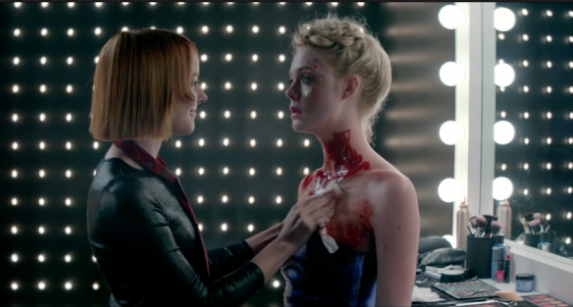Vanity may not be one of the seven deadly sins, but perhaps it ought to be based on Nicholas Winding Refn’s twelfth feature (yes, he existed before Drive), The Neon Demon. Dripping with lushness and the sexuality of death from the very first frame, the narrative centers on sixteen-year-old Jesse, a fresh transplant who has come to L.A. to pursue modeling. With no one in her life to turn to for support save for a photographer, Dean (Karl Glusman), she hires from the internet to take what will later be called the “amateurish” photos for her portfolio, Jesse is eager to befriend makeup artist Ruby (Jena Malone) when she invites her to her first party in the city.
Jesse’s naïveté is quickly torn to shreds when Ruby introduces her to two other models, Gigi (Bella Heathcote) and Sarah (Abbey Lee), who instantly display their viciousness toward her–particularly Gigi, taking offense after bragging, “[My surgeon] calls me the bionic woman” and Jesse responds, “Is that a compliment?” Gigi verbally lashes out at Jesse by mentioning how her parents are dead (something Jesse confided in Ruby) in reply to this effrontery. Feeling put in her place as she looks at Ruby in shock over this betrayal of confidence, Jesse lets them walk out of the bathroom, staring at herself in the mirror until Ruby finally calls out to her, making Jesse smile. The only thing worse than being totally isolated among people, after all, is being isolated.
Wasting no time in rising among the ranks of most sought after models, Jesse signs on with Roberta Hoffman’s (Christina Hendricks, always happy to lend a hand in a small role for Winding Refn) modeling agency, whereupon she’s instructed to tell anyone who asks that she’s nineteen. Regardless of her rising success, including a photoshoot with a highly sought after fashion photographer named Jack (Desmond Harrington), Jesse still inhabits a dubious rent by the night room in Pasadena where the manager, Hank (played to creep perfection by Keanu Reeves), bandies sinister phrases like “real Lolita shit.” Still in her phase of innocence and seeming incorruptibility, Jesse continues to see Dean, even though he can offer her nothing in the way of advancement financially or professionally. A particular scene of them overlooking all of Los Angeles strikes an undeniable chord as Jesse dances carefreely in the moonlight, riveting Dean to no end, and proving the essential thesis of the film, which is that beauty is the most captivating of traits. And the most dangerous when those around you quite literally want to suck it out of you.
Punctuated by a sinister soundtrack from Winding Refn’s go-to (his Danny Elfman, if you will), Cliff Martinez, the peaks of macabreness are accented with his distinct musical genius. The denouement that persists in rising to the surface with each ill-boding incident that peppers Jesse’s neon-saturated world, particularly a scene involving more than a bit of necrophilia, could not be iterated half as exaggeratedly without Martinez’s ear.
With every color-soaked frame, it becomes evident that there is something in The Neon Demon that takes what Brian De Palma has done for most of his career and puts it on steroids, combining it with Tarantinoesque grotesquerie and gloss.
To that point, a concluding scene that makes the detached eyeball more memorable than in Kill Bill Vol. 2 offers the most scathing but accurate assessment of beauty as the only currency worth having in a world that promotes impossible standards. Ones that will make you lust for it so bad, you’ll be driven to deranged acts you thought could only be carried out in Bret Easton Ellis’ version of L.A. But then, someone too beautiful for this world can never survive in it–no one wants to acknowledge “a diamond among a sea of glass,” lest they be forced to address their own lusterless existence.























[…] Glasslands is doing the same, re-branding to Diamondlands. Loosely borrowing from The Neon Demon screenplay, the owner of Diamondlands, Murray Yungurlluvr, a 39-year-old from Pittsburgh, stated, […]
[…] A few weeks spent isolated in a weekly rate-type hotel (though one slightly more inviting than the kind Jesse from The Neon Demon inhabits), however, cures Bobby of a lot of his romanticism. Allen’s decision to set the narrative […]
[…] from its, well, The Neon Demon-esque title intro (originally helmed by the title designs of Richard Greenberg), Stranger Things […]